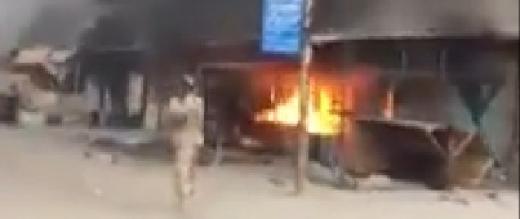
Shiite militias have razed shops and homes to the ground in a Sunni village on the outskirts of the Iraqi town of Tikrit in an apparent revenge attack.
Supported by various Shiite militia groups, the Iraqi army is in the midst of a huge operation to retake Tikrit from Islamic State (IS) group militants. As part of this operation, it took control of Al-Bouajil on Monday. Hours later, Shiite militiamen turned the village into a blazing inferno.
For several months, leaders of Shiite militias have been repeating calls for vengeance against Sunni tribes in the region, including the Al-Bouajil tribe, which lives in the village of the same name. Sunnis from the village are accused of taking part in a massacre led by Islamic State group in June 2014, when jihadists overran the Speicher military camp on the outskirts of Tikrit. About 1,700 Shiite soldiers are reported to have been slaughtered in the carnage.
A video uploaded to social networks shows men wearing combat uniforms setting fire to shops and houses in Al-Bouajil. Behind them, clouds of smoke rise up in thick black columns. The man filming the scene from a vehicle shouts to militiamen: “Burn them! Burn them!” The video also shows a procession of 4×4 vehicles carrying flags belonging to Shiite militias. Among them can be seen the flag of ‘Asa’ib Ahl al-Haq’ [Editor’s note: ‘League of the Righteous’], reputed as one of the most radical militias operating in Iraq. The group’s leader, Qais Khazali, had publicly called for “vengeance” for the victims of the Speicher massacre.
Mahmoud (not his real name) lives in Al-Bouajil. He fled the village a few days before the arrival of Iraqi forces.
Yesterday [Monday], several leaders — including the Provincial Governor and the leader of the ‘League of the Righteous’ — came to Al-Bouajil. They stood in front of TV cameras and gave interviews saying that the village had been ‘liberated’. But as soon as they left — along with the journalists who had accompanied them — fighters for the militia group started pillaging and burning houses and stores. Fortunately, residents who saw these revenge attacks coming had already fled the village several days earlier. Otherwise, there would’ve been a massacre.
Some members of the Al-Bouajil tribe did indeed join the ranks of the Islamic State group but that doesn’t mean that all of the tribe’s members are terrorists. Besides, other tribes also joined up with the jihadist group — but they weren’t subjected to the same fate as us. A few months ago, the leaders of our tribe gave the authorities the names of four of its members who had gone to fight alongside IS group militants. They were publically banished from the tribe. But the Shiites still came after us.
Now, our tribe members scattered across the country. They’re scared that they’ll never be able to come back home. The people fear that they’ve lost their belongings and land forever.
Between 60,000 and 90,000 Shiite militiamen and volunteers are thought to be fighting alongside the Iraqi army. This include men fighting under the flags of the ‘League of the Righteous’, the ‘Badr Brigade’, the ‘Peace Brigades’ [Editor’s note: Formerly known as the ‘Mahdi Army’, this militia was created by firebrand Shiite cleric Muqtadr al-Sadr in 2004 but later rebranded], and local groups belonging to Hezbollah.
Reports of abuses carried out in Sunni regions by militias allied with Iraqi security forces have increased dramatically in the last few months. According to Human Rights Watch, many of those unfortunate enough to live in areas ravaged by constant turf battles between IS militants and Iraqi forces have been expelled from their homes and, in some cases, summarily executed. In June 2014, at least 3,000 people from the region of Muqdadiyya in Diyala province were forced to flee their homes. Human Rights Watch says it’s still impossible for them to return.
France 24

Leave a Reply
You must be logged in to post a comment.